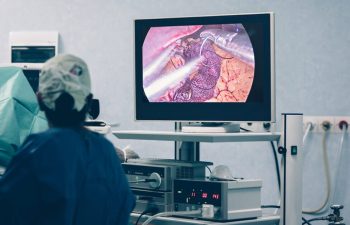
There are different ways of losing weight – diet plans and exercise regimes. However, in some cases, surgery might be the only resort to reduce weight. If you are one of those considering weight loss surgery, you must be well aware of the gastric sleeve procedure which is also known as vertical sleeve gastrectomy which is one of the most popular weight loss procedures.
It involves reducing the stomach’s ability to hold food by altering its size surgically. The surgery reduces the stomach’s size up to 20 percent of its original and consequently the amount of food consumed also reduces.
Before you go for gastric sleeve surgery there are quite a few things that you must know regarding this procedure.

#1 What Happens in a Gastric Sleeve Surgery
During this surgery the surgeon creates a small stomach ‘sleeve’ with the help of a stapling device, surgically removing about 75% of the stomach. You must also note that this procedure is irreversible.
The procedure is performed under general anesthesia that makes you sleep. A sleeve gastrectomy is usually done with the help of a small camera called a laparoscope that is put in your stomach and helps you see what’s inside.
The surgeon makes two to five small cuts for the laparoscope to pass through the stomach to perform the surgery through the openings. A large portion of the stomach is removed and the remaining parts are sewn together with the help of surgical staples. This creates a long vertical tube shaped stomach. The entire procedure takes about one to two hours.
#2 History of Gastric Sleeve Surgery
The gastric sleeve surgery was first introduced in the year 1988 as a restrictive part of bariatric surgery to treat morbid levels of obesity which called biliopancreatic diversion with duodenal switch (BPD-DS). This was done in two stages, with gastric sleeve surgery done first and then after a few weeks/months later the rest of the surgery was completed which involved reducing a part of the small intestine that absorbs food.
Sleeve gastrectomy showed good results and hence led to the proposal of the gastric sleeve surgery as a standalone procedure. Since 2003 the gastric sleeve surgery is being offered as an independent procedure.
Furthermore, in the year 2012 American Society for Metabolic and Bariatric Surgery (ASMBS) updated its position on gastric sleeve procedure as a bariatric procedure recognizing it as the primary procedure for weight loss.
#3 Is Gastric Sleeve Surgery Right for You?
You might choose surgical weight loss procedure if you are unable to lose and maintain weight by dieting and lifestyle changes or in case you are suffering from some critical health issues owing to obesity. Now, you must remember that the weight loss will happen slowly as compared to other procedures like gastric bypass and moreover you would have to be committed towards eating healthy and exercising.
It might be a case that your BMI is too high for a surgical weight loss procedure. This makes you suitable for a gastric sleeve surgery initially and another weight loss procedure some time later.
In any case scenario, it is best to speak with your surgeon about the weight loss surgery options that might work best for you.
#4 Benefits of Gastric Sleeve Surgery
The foremost benefit of gastric sleeve surgery is that it drastically leads to reduction in food intake. You would eat normal diet but smaller portions than before. This helps in achieving dramatic weight loss in a short period of time.
This surgery preserves the pylorus which regulates emptying of the stomach into the duodenum. Due to this, the food remains in the stomach for longer and you feel full for long. Moreover, this surgery does not affect food absorption which is why nutritional deficiencies do not occur.
Weight loss after gastric sleeve surgery can improve many medical conditions that you may be suffering from such as asthma, diabetes, high blood pressure, cholesterol and gastroesophageal disease.
#5 Risks associated with Gastric Sleeve Surgery
With any surgical weight loss procedure, there are certain risks involved. It is important that you have full information of these risks before you choose this procedure. While most of the patients do not suffer from any complications post this surgery, however, they might occur depending upon your health status. Some of them are:
- Leakage of digestive contents which can lead to infection.
- Adjacent organs getting injured during surgery
- Risk of gastritis, stomach ulcer and heartburn post-surgery.
- Difficult bowel movement post-surgery.
Final Thoughts
The decision of having a gastric sleeve surgery is a serious one, the effects of which are irreversible. Moreover, it is more than just surgery, it is a long term commitment to a healthy lifestyle and change of unhealthy habits.
If you are ready to lose weight, are willing to choose the path of healthy living and have interest in gastric sleeve surgery, Dr. David Davtyan and his adept staff can help you. Reach out to us today for more information.
Posted on behalf of Dr. David G. Davtyan MD, FACS, FICS





